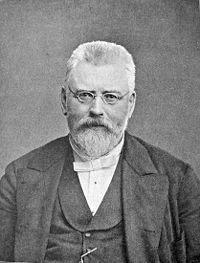
Christen Berg
Encyclopedia

Denmark
Denmark is a Scandinavian country in Northern Europe. The countries of Denmark and Greenland, as well as the Faroe Islands, constitute the Kingdom of Denmark . It is the southernmost of the Nordic countries, southwest of Sweden and south of Norway, and bordered to the south by Germany. Denmark...
liberal politician and editor. Often just referred to as “C. Berg”.
Belonging to a farmer’s family of North Jutland Berg started his career as a teacher, soon showing himself a reforming and active local politician. During 1850s his political interests were growing and from 1865 he was in parliament
Parliament
A parliament is a legislature, especially in those countries whose system of government is based on the Westminster system modeled after that of the United Kingdom. The name is derived from the French , the action of parler : a parlement is a discussion. The term came to mean a meeting at which...
as a member of Left
Left-wing politics
In politics, Left, left-wing and leftist generally refer to support for social change to create a more egalitarian society...
. Soon he became one of its leading figures and from the middle of the 1870s he, together with Viggo Hørup
Viggo Hørup
Viggo Lauritz Bentheim Hørup , was a Danish politician, journalist and agitator.He was the father to Ellen Hørup .One of the most influential politicians of the Danish non-Socialist left wing....
, was regarded the leader of the most opposing part of Left. From 1883 he was the chairman of the Folketing
Folketing
The Folketing , is the national parliament of Denmark. The name literally means "People's thing"—that is, the people's governing assembly. It is located in Christiansborg Palace, on the islet of Slotsholmen in central Copenhagen....
(first chamber).
Berg’s position was not only due to his political but also to his editorial role. He founded a lot of liberal provincial newspapers (“the Bergian magazines”) that were mouthpieces of his views. Politically he was an eager spokesman of parliamentarianism and of the right of the farmers versus the squire but unlike Hørup he was not that critical towards traditional national and religious ideals. They could meet in their bitter opposition against the Estrup
Jacob Brønnum Scavenius Estrup
Jacob Brønnum Scavenius Estrup, , was a Danish politician, member of the Højre party. He was Interior Minister from 1865 to 1869 in the Cabinet of Frijs and Council President as well as Finance Minister from 1875 to 1894 as the leader of the Cabinet of Estrup.-Biography:Estrup was son of the...
government but often fell out and 1884 they split up, Berg joining the more moderate parts of Left. After some years of moderate opposition (perhaps due to his hope of becoming a cabinet minister) he again took a sharp opposition against Estrup. 1886 he was imprisoned for some months because of a (rather dubious) accusation of urging to violence against the authorities, a jail term that weakened his health. From then he represented the intransigent line, from about 1890 again co-operating with Hørup and even with the Social Democrats
Social Democrats (Denmark)
The Social Democrats , is a Danish political party committed to the political ideology of social democracy. It is the major coalition partner in Denmark's government since the 2011 parliamentary election, and party leader Helle Thorning-Schmidt is the current Prime Minister of Denmark...
but he died before a solution had been reached.
As a politician Berg like Hørup first of all must be viewed a politician of opposition. In many ways he was the first in line of what has later been called “the Left chiefs” in Danish history, masterful, somewhat authoritarian and firm types which were however very popular among their voters. His opponents of the upper class often accused him of being an inelegant boor while his rivals among the liberals sometimes suspected him of being an opportunist and power seeking. The last accusation does not seem quite unjust but besides he was a man of principles. As a speaker he was undiplomatic, aggressive and simple but he managed to awake political interests of many Danish country people. His newspapers played a role in Danish politics during much of the 20th century and his political work was continued by Jens Christian Christensen.

